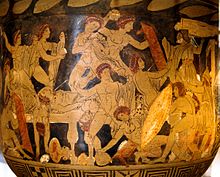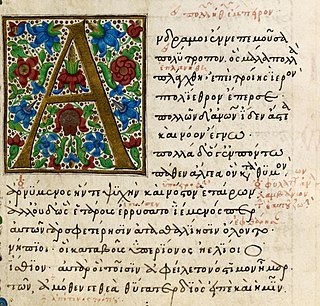
The Odyssey is one of two major ancient Greek epic poems attributed to Homer. It is one of the oldest extant works of literature still widely read by modern audiences. As with the Iliad, the poem is divided into 24 books. It follows the Greek hero Odysseus, king of Ithaca, and his journey home after the Trojan War. After the war, which lasted ten years, his journey from Troy to Ithaca, via Africa and southern Europe, lasted for ten additional years during which time he encountered many perils and all of his crewmates were killed. In his absence, Odysseus was assumed dead, and his wife Penelope and son Telemachus had to contend with a group of unruly suitors who were competing for Penelope's hand in marriage.
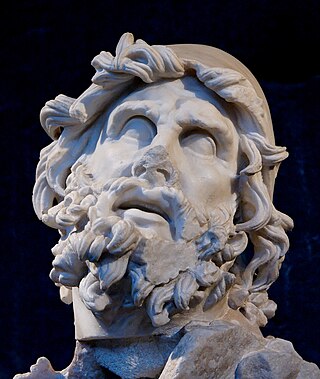
In Greek and Roman mythology, Odysseus, also known by the Latin variant Ulysses, is a legendary Greek king of Ithaca and the hero of Homer's epic poem the Odyssey. Odysseus also plays a key role in Homer's Iliad and other works in that same epic cycle.

The Trojan War was a legendary conflict in Greek mythology that took place around the 12th or 13th century BC. The war was waged by the Achaeans (Greeks) against the city of Troy after Paris of Troy took Helen from her husband Menelaus, king of Sparta. The war is one of the most important events in Greek mythology, and it has been narrated through many works of Greek literature, most notably Homer's Iliad. The core of the Iliad describes a period of four days and two nights in the tenth year of the decade-long siege of Troy; the Odyssey describes the journey home of Odysseus, one of the war's heroes. Other parts of the war are described in a cycle of epic poems, which have survived through fragments. Episodes from the war provided material for Greek tragedy and other works of Greek literature, and for Roman poets including Virgil and Ovid.

Penelope is a character in Homer's Odyssey. She was the queen of Ithaca and was the daughter of Spartan king Icarius and Asterodia. Penelope is known for her fidelity to her husband Odysseus, despite the attention of more than a hundred suitors during his absence. In one source, Penelope's original name was Arnacia or Arnaea.

Telemachus, in Greek mythology, is the son of Odysseus and Penelope, who is a central character in Homer's Odyssey. When Telemachus reached manhood, he visited Pylos and Sparta in search of his wandering father. On his return to Ithaca, he found that Odysseus had reached home before him. Then father and son slew the suitors who had gathered around Penelope. According to later tradition, Telemachus married Circe after Odysseus's death.
In Greek mythology and history, there were at least eleven men named Medon.

In Greek mythology, Anticlea or Anticlia was a queen of Ithaca as the wife of King Laërtes.
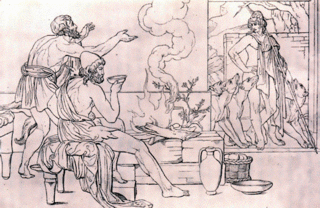
In Greek mythology, Eumaeus was Odysseus' slave, swineherd, and friend. His father, Ctesius, son of Ormenus, was king of an island called Syra, although it has also been suggested that Eumaeus may have referred to Syracuse, Sicily.

In Greek mythology, Eurycleia, or Euryclea, is the daughter of Ops and granddaughter of Peisenor, as well as the wet-nurse of Odysseus.

In Greek mythology, Nestor of Gerenia was a legendary king of Pylos. He is a prominent secondary character in Homer's Iliad and Odyssey, where he appears as an elderly warrior who frequently offers advice to the other characters.
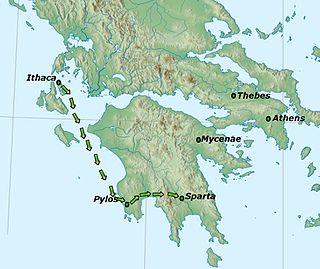
The Telemachy is a term traditionally applied to the first four books of Homer's epic poem the Odyssey. They are named so because, just as the Odyssey tells the story of Odysseus, they tell the story of Odysseus's son Telemachus as he journeys from home for the first time in search of news about his missing father.

In Homer's Odyssey, Argos is Odysseus' faithful dog.
The Telegony is a lost ancient Greek epic poem about Telegonus, son of Odysseus by Circe. His name is indicative of his birth on Aeaea, far from Odysseus' home of Ithaca. It was part of the Epic Cycle of poems that recounted the myths of the Trojan War as well as the events that led up to and followed it. The story of the Telegony comes chronologically after that of the Odyssey and is the final episode in the Epic Cycle. The poem was sometimes attributed in antiquity to Cinaethon of Sparta, but in one source it is said to have been stolen from Musaeus by Eugamon or Eugammon of Cyrene. The poem comprised two books of verse in dactylic hexameter.

The Odyssey is a 1997 American mythology–adventure television miniseries based on the ancient Greek epic poem by Homer, the Odyssey. Directed by Andrei Konchalovsky and co-produced by Hallmark Entertainment and American Zoetrope, the miniseries aired in two parts beginning on May 18, 1997, on NBC. It was filmed in Malta, Turkey, parts of England and many other places around the Mediterranean, where the story takes place. The cast includes Armand Assante, Greta Scacchi, Irene Papas, Isabella Rossellini, Bernadette Peters, Eric Roberts, Geraldine Chaplin, Jeroen Krabbé, Christopher Lee and Vanessa Williams.
In Greek mythology, Thrasymedes was a prince of Pylos and a participant in the Trojan War.
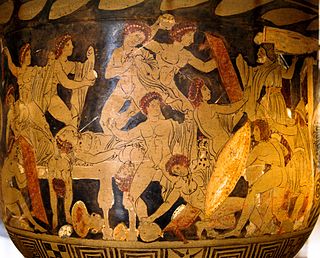
Philoetius is a character in Greek mythology who plays a significant role in Homer's Odyssey, aiding Odysseus, Telemachus, and Eumaeus in their slaughter of the suitors of Penelope.

The Returns from Troy are the stories of how the Greek leaders returned after their victory in the Trojan War. Many Achaean heroes did not return to their homes, but died or founded colonies outside the Greek mainland. The most famous returns are those of Odysseus, whose wanderings are narrated in the Odyssey, and Agamemnon, whose murder at the hands of his wife Clytemnestra was portrayed in Greek tragedy.

In Greek mythology, the suitors of Penelope are one of the main subjects of Homer's Odyssey.

The Odyssey is an eight-episode European TV miniseries broadcast on RAI in 1968 and based on Homer's Odyssey. An Italian, Yugoslavian, German and French coproduction, it was directed by Franco Rossi, assisted by Piero Schivazappa and Mario Bava; the cast includes Bekim Fehmiu as Odysseus and Irene Papas as Penelope, Samson Burke as the Cyclops, as well as Barbara Bach as Nausicaa, and Gérard Herter. Several critics consider the series to be a masterful representation of the ancient world.
In Greek mythology, Telegonus was the youngest son of Circe and Odysseus and thus, brother to Agrius and Latinus or Nausithous and Nausinous, and Cassiphone. In some accounts, he was called the son of the nymph Calypso and Odysseus instead.
